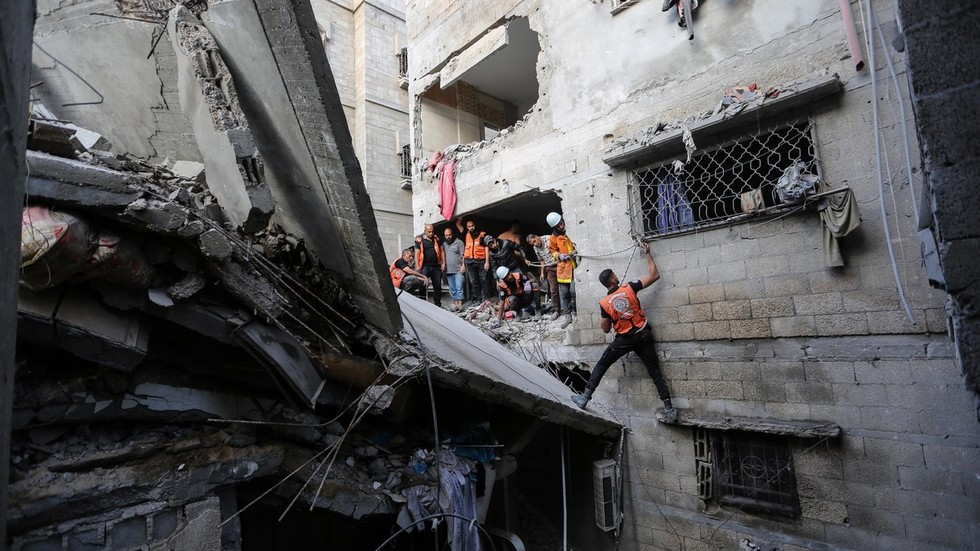Social media influencers, public figures and local and international faith-based organizations are amplifying claims of a “Christian genocide” in Nigeria. They point to the wave of attacks on churches and Christian communities across the central and northern parts of the country.
In one instance, US senator Ted Cruz said on social media platform X that Nigerian officials are ignoring and enabling “the mass murder of Christians by Islamist jihadists.” Cruz even introduced a bill aimed at sanctioning Nigeria for the persecution of Christians. The Nigerian government denies the claims.
Minister of Information and National Orientation Mohammed Idris admits that Nigeria has security problems but the claims of a “deliberate, systematic attack on Christians is inaccurate and harmful.”
Security, especially in the predominantly Muslim north of the country, has been deteriorating for years. Some 10,000 people have been killed and hundreds abducted since Bola Tinubu became Nigeria’s president in mid-2023. The violence has pushed as many as 3 million people out of their homes.
Benue and Plateau in the northcentral region are the worst-hit. Armed groups have killed and kidnapped people and destroyed buildings, schools, clinics and places of worship.
Analysts and survivors say the violence cut across faiths and that it is driven as much by land disputes, climate change, poverty and weak governance as by religion itself.
Nigeria: faultline between farmers and herders
Nigeria is bruised by fluid and overlapping security challenges across regions. In the North East, the Boko Haram insurgency is intensifying. The jihadist militant group has killed tens of thousands of people since it was founded in 2002. In 2014, the group kidnapped more than 250 school girls in Borno State, Nigeria.
Criminal gangs and kidnappers prowl the North West. They often target people in rural underserved communties.
In the Middle Belt, including states like Benue, Plateau, Nasarawa and Southern Kaduna, many lives have been lost in communal and pastoralist violence.
In July, attackers stormed the farming village of Yelwata in Benue, killing at least 160 people. The fertile region sits at the fault line of Nigeria’s deepening farmer — herder crisis where mostly Christian farmers and mostly Muslim Fulani herders have a long history of tension and clashes.
Attacks and reprisals on both sides go back decades and have grown deadly. Christian farming communities bear the brunt of the violence and accuse the government of failing to acknowledge the scale, including the ethnic and territorial undertones of the crisis.
Fr. Atta Barkindo, Executive Director of the Abuja-based Kukah Centre, believes the “Christian genocide” narrative stems from the inability of the government to protect its citizens.
“What has been happening in Nigeria, and I don’t want the debate to overshadow this, is a matter of mindset,” Barkindo told DW.
“These things are very historical. In my opinion, I don’t think there is a deliberate intention on the part of the Nigerian government to kill Christians or to deploy state actors to do so. I don’t think that’s really the case. I believe what people are trying to express is the government’s failure to protect its citizens and when the majority of those killed or targeted happen to be Christians, it naturally fuels that perception.”
What survivors say
On a quiet Sunday evening in May, Comfort Isfanus was stirring a pot of dinner in her small kitchen in the Bokkos area of Plateau state when she heard hurried footsteps outside. Her husband, Danladi, ran into their compound, panting and covered in dust. He had just heard that armed men were approaching their community. He grabbed her hand and told her to gather the children to safety, she told DW.
“After we ran away, he remained at home together with his younger brother. They [armed men] met them at home and killed them. Our houses were burnt down and now we are suffering with no food and no shelter for our children. Now they don’t have [anything] to eat, no school, no business, nothing.”
Karimatu Aminu lost her husband in the crisis too. It was a Thursday morning in late December when she was seeing him off to the farm. He had asked her to stop by the local market and buy a few things for the evening. That, she told DW, was the last time she saw him alive.
“This isn’t just about one group… When Fulani houses are burnt today, tomorrow the houses of the Christian community are burnt too. Both sides are losing people and homes,” Aminu said.
Christian-Muslim mistrust
For many communities in the region, the violence goes beyond the tit-for-tat killings between herders and farmers, but part of a campaign to drive them away from their land — relics of their mistrust of ethnic Fulani pastoral groups which dates back to the infamous Islamic jihad that swept across northern and central Nigeria and disrupted local structures and political systems.
Analysts say the deep-rooted history continues to shape modern conflict in the region as many groups — who were never fully conquered then — interpret today’s crisis not just as merely a dispute over land or resources, but as a continuation of that historical aggression, fuelling Christian-Muslim mistrust.
In June, the traditional leader of the ethnic Tiv in Benue state, James Ortese Iorzua Ayatse, dismissed the farmer-herders narrative. “What we are dealing with here in Benue is a calculated, well-planned, full-scale genocidal invasion and land-grabbing campaign by herder terrorists and bandits.” he said.
A necessary conversation?
Samuel Malik, a senior researcher at the pan-African Good Governance Africa think tank, believes that some of the violence, particularly in parts of northcentral Nigeria, may have religious undertones. But “there is no credible evidence of a state-led or coordinated campaign to exterminate Christians, which is what genocide is,” Malik told DW.
Insecurity in Nigeria, he said, is instead rooted in a complex cocktail of “governance failures, corruption, poverty, climate-induced livelihood pressures, insurgency and organized criminality, and describing it as a genocide oversimplifies these dynamics.”
Narratives such as the so-called “Christian genocide” claim obscure the overlapping drivers of conflicts in the country and could undermine interfaith and community-level peacebuilding efforts.
“The ‘genocide’ narrative, largely promoted by certain Western advocacy and religious groups, has significant implications. It is a case of giving a dog a bad name to hang it,” Malik told DW.
It “pressures foreign governments, especially the United States, to adopt punitive and moralistic positions toward Nigeria rather than pursuing constructive, evidence-based engagement,” he said. “Furthermore, it damages the Nigerian government’s international reputation by portraying it as complicit in religious persecution, making it difficult or impossible to get the support it requires to deal with the problem of insecurity.”
Fr. Attah agrees that the narrative can deepen divisions and mistrust.
It can also help to create awareness about the violence, he says: “It’s raising questions beyond just the claim of genocide. It’s raising very important issues about security and insecurity generally in the country, and why we need to have this conversation.”
Edited by: Benita van Eyssen







